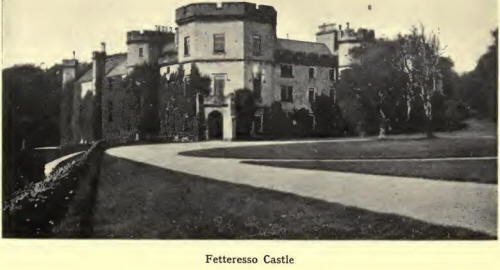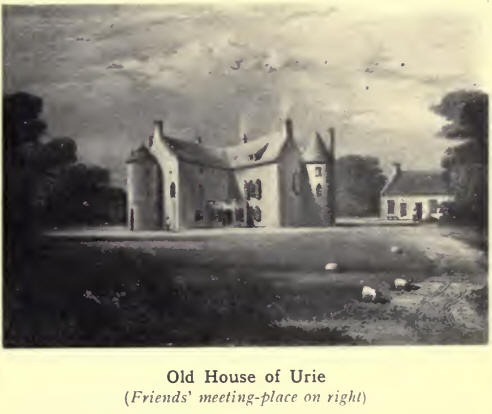The mansions of the
Mearns are not only numerous, but in many respects remarkably elegant
structures. Several are of ancient foundation, and have been remodelled
or enlarged as the demands for convenience and domestic comfort grew
with the improving spirit of the times. Many of the sites are
well-chosen either for beauty or, as in the case of older castles, for
defence or observation. Of the castles on or near the coast the most
interesting historically is I'etteresso Castle, formerly the home of the
Earls Marischal. It was burned by the Marquis of Montrose in 1645, and
rebuilt in 1671 ; but a large part of it is only about one hundred years
old. After landing at Peterhead, in 1715, the Chevalier went to
Fetteresso, where he was warmly received and hospitably entertained for
more than a week. At the door of the castle he was proclaimed James
VIII. by the Earl Marischal. The castle stands in the Carron valley near
Stonehaven. In the same locality is Urie House, a fine mansion in the
Elizabethan style, amid some 700 acres of well-wooded grounds along the
Cowie Water. Urie belonged to the Marischal family, and then to the
Barclays, of Quaker, farming, and pedestrian fame.

Further south on the
coast there is a succession of mansions. Hallgreen Castle, overlooking
Bervie Bay, dates from the sixteenth century, but has modern additions.
Brotherton Castle, a little to the north of Johnshaven, is a fine
building in the baronial style. Lauriston Castle, occupying a
picturesque situation in the “Den” of the same name, was built by the
Straitons in the thirteenth century. Alexander Straiton, “the knicht of
Lauriston,” was one of the 500 knights slain at Harlaw in 1411.
Ecclesgreig Castle, on a rising ground to the north of St Cyrus village,
is modern. Its steep-pitched roof and crow-stepped gables, surmounted by
conical turrets, give it a graceful and imposing appearance. The
surrounding policies are tastefully laid out.

The Burn House, built in
1791 by Lord Adam Gordon, is romantically situated on the east bank of
the North Esk. The house, itself a massive but somewhat plain structure,
is surrounded by “woods, walks, and scenes of beauty,” as picturesque as
any in the county, forming a striking contrast to the “dreary desert”
the spot was said to be towards the end of the eighteenth century.
Fasque House, a splendid pile built in 1809 in the English baronial
style, is a very commodious mansion, and from its elevated situation
commands an extensive and magnificent view of the Howe. It is the
residence of Sir John Gladstone, the nephew of the late Right Hon. W. E.
Gladstone, who as a young man, frequently resided here. Drumtochty
Castle, a fine Gothic building, occupies an ideal site on the richly
wooded bank of the Luther, opposite Strathfinella Hill. Monboddo House
is more interesting historically than architecturally, as the birthplace
and residence of Lord Monboddo.
Dr Johnson thus refers to the visit which he paid to Monboddo in 1773:
“Early in the afternoon Mr Boswell observed that we were no great
distance from the house of Lord Monboddo. The magnetism of his
conversation easily drew us out of our way, and the entertainment which
we received would have been a sufficient recompense for a greater
deviation.” Glenbervie House, on the north side of the Bervie Water, was
an ancient seat of the Douglases, and the oldest part dates back to the
twelfth century at least. Other mansions in the Howe district are
Inglismaldie House in Marykirk, one of the seats of the Earl of Kintore;
Fettercairn House, dating from 1666, but at various times considerably
improved and enlarged; Thornton Castle, also a very old building, about
two miles west of Laurencekirk; Arbuthnott House, on the left bank of
the Bervie Water, the seat of the old family of Arbuthnott.
Of the larger mansions on Deeside, Kincausie House, and Durris House are
the oldest. The former, beautifully situated on the right bank of the
Dee about seven miles from Aberdeen, is surrounded by fine old timber.
Durris House, an elegant and very substantially built modern mansion,
was erected close to the site of the old castle of Dores, a residence of
Alexander III.
|

